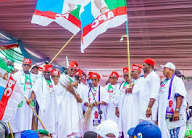NMA Slams Tinubu Over Saint Lucia Doctor Deal, Decries Poor Pay, Welfare for Nigerian Health Workers
The Nigerian Medical Association (NMA) has strongly criticised President Bola Ahmed Tinubu’s administration over its recent agreement to deploy Nigerian doctors to Saint Lucia, describing the move as “morally unjustifiable” amid worsening conditions for medical professionals in the country.
The deal, signed in June with the Organisation of Eastern Caribbean States (OECS), seeks to send Nigerian doctors to the Caribbean nation to bolster its healthcare system.
Under the arrangement, Nigerian doctors are to earn between ₦40.8 million and ₦131.7 million annually—far more than the approximately ₦11.9 million earned at home under the Consolidated Medical Salary Structure (CONMESS).
In a statement issued by NMA Secretary General, Dr. Benjamin Egbo, the association expressed outrage, saying it was unacceptable that Nigerian doctors were being deployed abroad while those at home continue to suffer from poor remuneration, unpaid allowances, and deteriorating working conditions.
The NMA said the federal government had failed to prioritise the needs of the health sector, accusing it of neglecting local professionals in pursuit of foreign policy objectives.
“The Nigerian government cannot claim to value its doctors while it underpays them and subjects them to degrading conditions at home, only to present them as exportable commodities abroad,” Egbo said.
The association also condemned the continued implementation of a controversial circular by the National Salaries, Incomes and Wages Commission (NSIWC), which it said had worsened the plight of doctors and undermined the dignity of the profession. It argued that the circular has resulted in arbitrary and unjust deductions in doctors’ earnings.
As part of its response, the NMA issued a 21-day ultimatum to the federal government on July 2 to address key demands, including the withdrawal of the NSIWC circular, implementation of all outstanding collective bargaining agreements, payment of the Medical Residency Training Fund (MRTF) for 2023 and 2024, and the upward review of the CONMESS structure in line with inflation and current economic realities.
The association also demanded the restoration of full hazard allowances across all tiers of government, improved funding for medical training institutions, and urgent steps to curb the ongoing mass exodus of Nigerian doctors abroad.
It warned that failure to address these concerns within the stipulated time could lead to industrial action, with serious consequences for healthcare delivery nationwide.
Meanwhile, the federal government has defended the agreement, stating that it is part of Nigeria’s South–South cooperation and diplomacy strategy. It explained that Nigeria would shoulder the cost of salaries, medical licensing, and logistics, while Saint Lucia would provide accommodation and local support for the deployed doctors.
However, many in the health sector and wider civil society see the initiative as an ill-timed distraction from the government’s domestic obligations. Critics argue that the plan ignores the country’s deepening healthcare crisis, with hospitals severely understaffed and a growing number of professionals leaving for better opportunities abroad.
As tensions mount, all eyes are now on the federal government’s next move, with the NMA maintaining that only swift and meaningful action will prevent a major disruption of the healthcare system.







